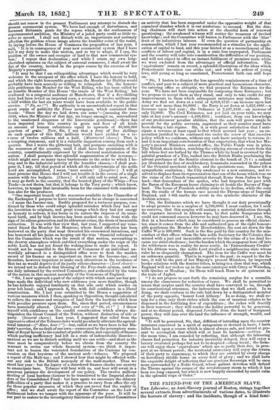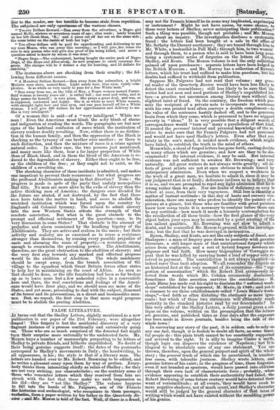THE FRIEND-FOE OF THE AMERICAN SLAVE. THE Liberator, an Anti-Slavery
journal of Boston, strings together several extracts from advertisements of various dates, to illustrate the horrors of slavery : and the incidents, though of a kind fami- liar to the reader, are too terrible to become:stale from repetition. The subjoined are only specimens ,of the various Glasses.
" Twenty Dollars lleward.—Ran away from the advertiser, a Negro girl named Molly, 'sixteen or seventeen years of age ; slim made ; lately branded on her left cheek thus, 'R.,' and a piece out. off her ear on the same side ; the same letter on the inside of both her legs."
" Ten.silver dollars will be paid for apprehending and delivering to me my man Moses, who ran away this morning; or I will give five times the sum to any person who will:give due proof of :his being killed, and never a question asked to know rby whom it was done." "Negro 'Dogs.—Tho undersigned, having bought the entire pack of Negro Dogs, of the Hays and Allenistock, he now proposes to catch runaway Ne- groes. His charges will be 3 dollars a day far hunting, and 16 dollars for
catching." The instanoes above are shocking from their cruelty ; the _fol- lowing from different causes.
." A Hundred Dollars Iteward.--atan away from the subscriber, :a bright Mulatto man slave, named Sam. Light sandy hair, blue eyes, :ruddy com- plexion. Is so white as very easily:to paeafor a free White man."
"Run away from me, on the '15th of May, a Negro woman named Fanny. Said woman is twenty years old ; is rather tall ; can read and write, and so forge passes for hersf ; is vary pious. She prays ii,great deal, and was, as is supposed, contented and happy. She is as white as most White women, with straight light hair and blue eyes, and can pass herself off for a White woman. I will give 600 dollars for her apprehension and delivery to me. She is very intelligent." Of a woman this is said—of a "very intelligent" White wo- man ! Even the American must :blush the ashy blush of shame and indignation at reading the words. The paragraphs are but new -signs of the habitual confusion of races which the institution of -slavery renders -doubly revolting. Now, either there is no -distinc- tion in the human family, and then the 'oppression of the Black is shocking as the tyranny of one brother over another ; or there is 'such distinction, and then the mixture of races is a crime against natural order. In either case, the two persons just mentioned, and many more like them, bear a far larger proportion of White than of Black blood, and in them the blood of the American is re- duced to the degradation 'of slavery. Either they ought to be free, as the children of the free ; or they ought not to exist, as the children of a revolting sin. The shocking character.• of these incidents is admitted, and-makes one impatient to prevent their recurrence : but what progress are the professed Abolitionists making in that direction? None : the progress is .made in spite of the party that unduly -monopolizes that title. No men are more alive to the evils of slavery than the active thinking men of America the dangers once dreaded for the future are -abated, if not destroyed, by the fact that those men have taken the matter in hand, and mean to abolish the wretched institution 'which was forced upon the caturtry• by _England's old Colonial tyranny. The refusal to .admit slavery 'into the new Western States attests the strength of that resolute conviction. But what -is the great obstacle to the 'prompt and •effectual 'settlement of the question—nay, to its -very discussion in some States? That obstacle is the amount 'of :prejudice and alarm occasioned by the headlong bigotry of the :Abolitionists. They are active and zealous in the cause; but their activity and zealotry are so exercised as to rouse a resistance _stronger than themselves, by rousing everypossible prejudice of caste and alarming the sense of property,—a resistance strong enough to overwhelm the provoking power. The Abolitionists, therefore, are the great obstruction to thezabolition of slavery; and the 'very first step towards any .marked and :effectual progress -would be the abolition of Abolition. The whole machinery -.Should be swept away, from -the 'branch association of the -village to the squadron 'which Great Britain -forces other states 'to help her in maintaining on the coast of Africa. As soon as 'that should be done, or the idle fanaticism had been so far broken up as to leave -none .but .a few unheeded relics in a conventicle ,here and there, the real convictions and feelings of the Ameri- tans would have freer play, and we ahould soon see more of the . States, and yet more, proceeding to deal with the subject, disarmed elf its terror and its provocations, in :a direct-and businesslike man- ner. But, we -repeat, the first step in that more rapid progress must be to abolish the prating Abolition.



























 Previous page
Previous page